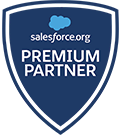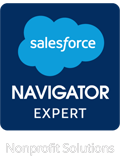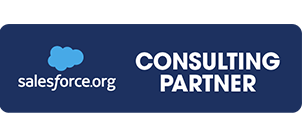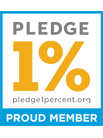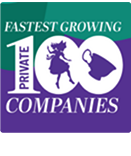So you’re having a Salesforce baby...
When you’re pregnant you have a lot of stuff to do and you find yourself researching things you never expected and didn’t even know to consider.
Probably the best advice I received when I was pregnant was “make a birth plan, then rip it up.” Just throw your expectations out the window. Because, while you have lots of expectations, reality usually has its own idea.
And the more I work with clients during their Salesforce implementations, the more I can see the similarities to becoming a parent. You’re doing tons of research on things you have no previous vocabulary for, choosing someone to help you make it to a delivery date, and maybe even cleaning out an office to turn it into a calm and organized nursery.
Women have been having babies much longer than people have been implementing Salesforce, so there’s a good chance pregnancy has something to teach us here about how to tackle a complex project. Let’s break this comparison down into trimesters so you can see what should be happening as you prepare for a Salesforce implementation.
First Trimester
You’re still getting used to the fact that you are going to have a new database, but the clock starts ticking as soon as there’s a timeline or grant involved. At this stage you’ll start getting your ducks in a row and looking at your CRM and consultant options.The hype of having a new database is building up but you and your team are keeping it mostly quiet to solidify plans.
Right now you should be thinking about your data, a lot. Is the data clean (are you taking your prenatal vitamins)? Where will it be kept (do you have space for a nursery)? And who’s ultimately involved in this project (who’s your support team)? As with birth, trust those who have traveled this path before you: start conversations with a few select people you trust, who have been through a recent implementation, to learn all the information you can from them.
Second Trimester
You’re feeling stronger and more confident now, and there’s a lot of work to be done in this trimester. You’ve started talking to a few consultants (just like you would a few doctors). You’re expanding your connections and talking to more people about their experiences.You’ve been asking “what should I expect?” And “how do I choose a consultant?”
Just as advice on when to get an ultrasound and how to pick a doctor can vary, the approach can vary for consulting firms. You might like a clinical approach or a less medicalized, more nurturing approach, everyone is different. You’ll need to find a style that fits your needs. And the best way to determine this is, again, to talk to people.
At this point, you should also be making some announcements at your workplace. As the lead Salesforce admin, you will have your hands full with a new database, so your co-workers should plan for your role to change, at least temporarily. You should also be heavily cleaning your data at this point. Just like you wouldn’t be moving furniture and painting a nursery the week of your due date, you won’t want to be hastily formatting all the state and phone number fields days before a kick off call. As you don’t have 40 hours dedicated to cleaning up data right now, it’s not realistic to think you’d have that time during your project. Take this time to clean your data so when you’re ready to move the data it’s as easy as possible.
Third Trimester
You might have chosen your consultant, but if not you should be at least regularly conducting interviews. You’ll also want to be finishing up any last data cleaning, formatting, and organization.
It’s time to get in the know about Salesforce. You’ll want to begin learning all you can and taking a few Trailheads. You should also be regularly talking about your project and using online resources you trust to learn what is good data management, how Salesforce works, and what pitfalls to avoid. Lean on your consultant and community (for nonprofits there’s the Power of Us HUB and for private sector companies there’s the Salesforce Success Community.)
With your due date approaching (aka the kick off of the project), you should really be considering the financials of this project. With help from your consultant, consider what applications you’ll need connected and see what you can get for free or at a discount.
Fourth Trimester
Congratulations- you’ve just started your Salesforce project! Just as in real life, the big deal is when you actually have the baby. Your role has temporarily changed as you focus solely on this project.
And now someone has to take care of this new Salesforce database. The reality is that a database, especially in the first few months after kick off, requires almost the same amount of time as a newborn baby. Thank you goodness you will at least get more sleep!
It’s funny to say but the fourth trimester is a real thing. With babies, the fourth trimester is the time a baby does her final development, after she’s been born. And for Salesforce this is when it begins to develop into a database you can really use. With user stories bringing in real life scenarios and testing and constant questions from your consultant, your Salesforce project will need a lot of attention.
At this point, you’re kind of exhausted and you don’t totally know what you’re doing. This is when a support network is important. Find those people whom you have come to rely on and ask them to help. Order take-out and give yourself a break from cooking from scratch - you have other things on your mind. Find a local user group online and attend a meeting. You’ll notice your processes may be changing, but for the better. Embrace the change and remember to take some time for self-care.
See how much work goes into just prepping for a Salesforce project?
While we take the time off to have babies, we don’t really do this with a Salesforce project. But you can’t actually have a new baby and do your job at the same time. By taking a few months away from your regular job to just be the project lead or project manager, you are giving your Salesforce project the attention it will need and setting yourself up for a much happier life.
Ready to talk more about what a Salesforce project could look like for you? We have a decade of experience delivering healthy Salesforce projects and we’d love to talk about what this could look like for you.










